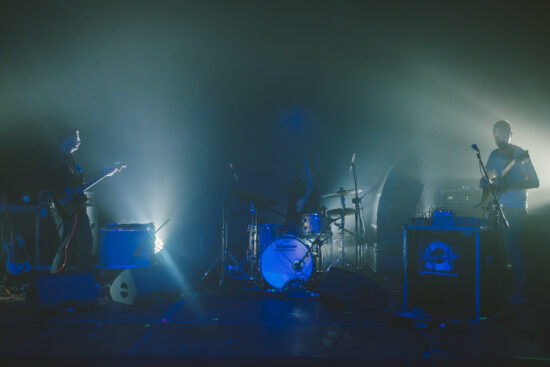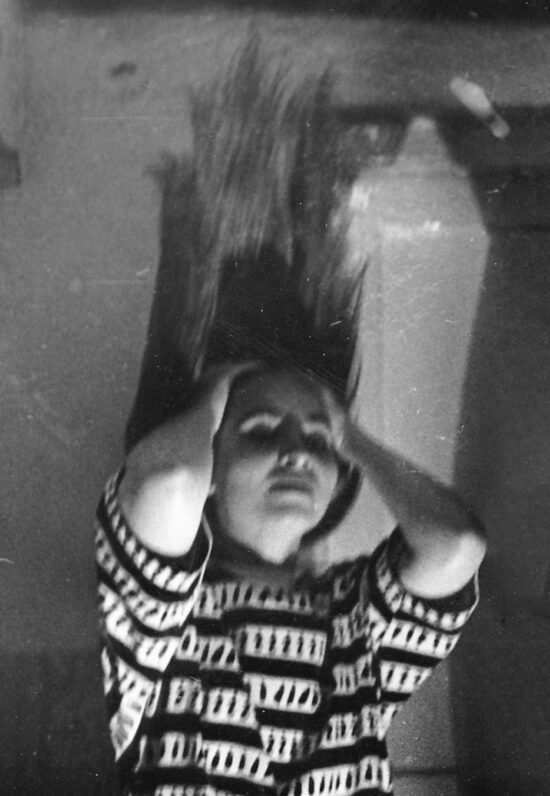Throughout forty minutes, Horse Lords combine microtonal harmonies, polyrhythms, minimalism, mathematical structures, dance potential and an algorithmic approach that sometimes reminds me of the Orange Milk roster.
Translation: Aleksandra Szkudłapska
In my personal opinion, Horse Lords are one of the most interesting contemporary bands around. The four musicians from Baltimore are musical erudites, able to brilliantly put their compositional ideas to life: both on their full-length albums, solo releases and occasional mixtapes (like the daring interpretation of Julius Eastman’s “Stay On It”). They first attracted my attention with Interventions, combining polyrhythms in the style of guitar bands from the Sahara desert, saxophone minimalism and pulsating trance played by the rhythm section. And then came the concerts, where the quartet shows that their mathematical music, precise down to the last detail, can be faithfully and ecstatically transposed onto the stage.
The Common Task, their third LP, includes five intense tracks that, in a way, also extend an invitation to dance: this is all very carnal, thanks to the amazing trance they are able to create as if effortlessly. Throughout forty minutes, the group combine microtonal harmonies, polyrhythms, minimalism, mathematical structures, dance potential and an algorithmic approach that sometimes reminds me of the Orange Milk roster. Horse Lords broaden their musical language with the use of synthetic sounds, modulating individual fragments, which places them somewhat halfway between playing together as a group and using synthetic filters that distort the music, revealing its different timbres. Horse Lords bite into their rhythmical section with Max Eilbacher’s bass and Sam Haberman’s drums, adding melody with Andrew Bernstein’s delicate, interlacing saxophone phrases and Owen Gaertner’s guitar escapades (he really plays the guitar as if it was a banjo).
This minimalism comes through from the mighty opening of “Fanfare for Collective Freedom”, particularly in the coherent guitar and saxophone sound (a dialogue that also comes to the fore in “Against Gravity”), but also in the final, algorithmically mechanized compression. “The Radiant City” synthetizes the bagpipe sound, and vigilantly builds the drone layer, while “People’s Park” moves from the dehumanised opening, through pulsing synths and dub reggaeton-based grooves, to the polyrhythmic drumming finale in the style of Reich’s “Drumming”. The whole album concludes with an almost 20-minute suite “Integral Accident”, which gradually grows from an ambient background with Vonnie Landers’ vocals, to incorporate the accordion, violin and bassoon.
Horse Lords skilfully jump between various styles, drawing on The Ex and American minimalists, broadening the sonic parameters of their music, but all the while in a light and convincing formula. They embark on sonic experimentation and synthetic forms without the excess pathos of contemporary composition. In doing so, they are coherent and consistent, playing their music like next-door lads rather than overintellectualized composers removed from the everyday – you really do feel the life and energy in their tracks. The Common Task is by no means removed from contemporary life, a fact that comes through in the politically motivated titles, the reviving character of their music, and even the cover: rhythmical lines drawn by abstractionist Wacław Szpakowski are ideally bound to the band’s sound.
Horse Lords, The Common Task, Northern Spy




